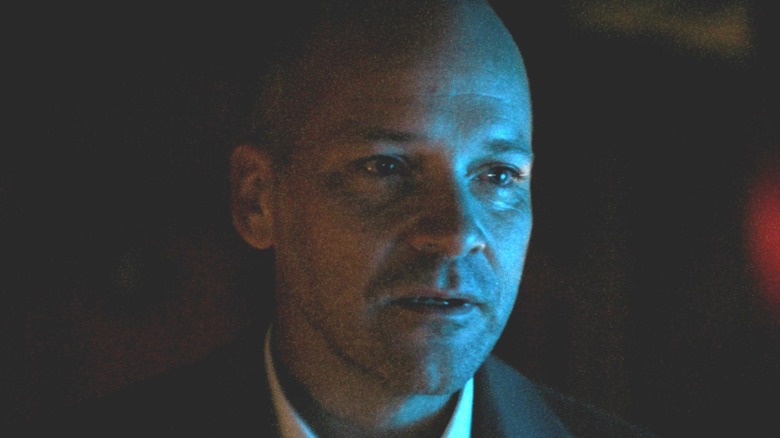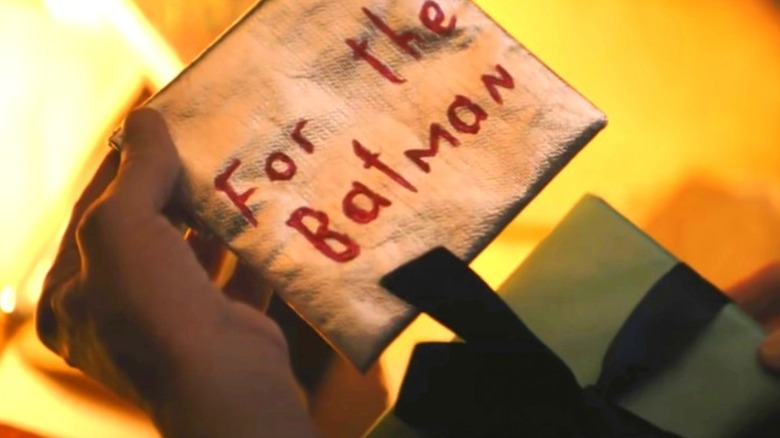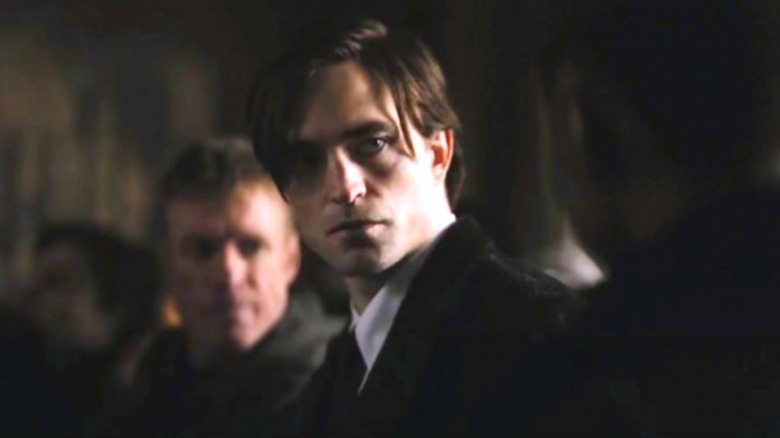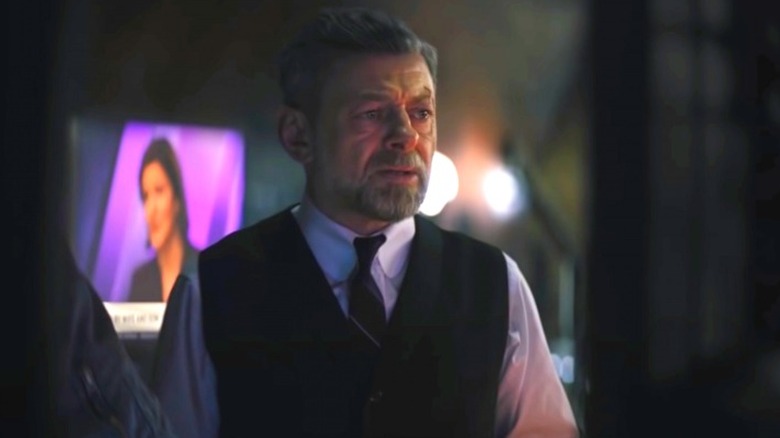The Saddest Scene In The Batman
When thinking about the life of Bruce Wayne, many can agree that his most definitive scene is his most tragic. Most iterations of the Batman story, at some point, have depicted the event that sealed his fate — the murder of his parents — a moment that changes the course of his life forever, driving him to create a symbol that drives the criminals of Gotham to fear him.
Matt Reeves' "The Batman," unlike so many previous cinematic incarnations of the character, does not tread on this familiar territory. When "The Batman" picks up, it is two years after Bruce (Robert Pattinson) has started wearing the cowl. He feels the trauma of his past deeply, but it is represented more in what is not said, than what is.
Bruce has become reclusive, hiding away in Wayne Tower with Alfred (Andy Serkis), only venturing out around people when it will help him solve a mystery. There are many aspects about this version of Batman that are heartbreaking. Bruce's self-imposed isolation, and his inability to connect to other people in a meaningful way, is just one of them. And in the midst of all the murder and mayhem the film depicts, it is one scene in particular that shows just how sad the life of Gotham's Dark Knight truly is.
Alfred's near-death leads to many heartbreaking revelations
Throughout the film, Bruce has made it abundantly clear how alone he is. He goes out at night and fights as many criminals as he can. When he comes home, the only person who tries to forge a connection with him is Alfred, but it's a one-sided effort.
Alfred is concerned about Bruce's nighttime activities and why a serial killer is leaving him messages. But for all of Alfred's attempts to take care of Bruce, the young Wayne pushes him away. He tells Alfred that he isn't his father and doesn't accept his guidance. This dynamic reaches its devastating peak when the Riddler sends a package to Wayne Tower, meant for Bruce — and instead Alfred opens it, just as a bomb inside is detonated.
Alfred survives the attack, but he is terribly wounded. When he regains consciousness in the hospital, he and Bruce have a loaded conversation, full of pain and unresolved trauma. Both Alfred and Bruce have burdens they need to unload upon one another, and when they do, it finally brings them together.
Bruce never thought he would feel that type of fear again
The relationship between Alfred and Bruce in "The Batman" is more fractured than in, perhaps, any previous version of the story to date. Both characters are far edgier than we are used to seeing them, having deep emotional scars that they carry around at all times.
When Alfred first wakes up from his injuries, Bruce is there by his side — but rather than express upset, the Dark Knight's first response is to accuse his longtime butler of keeping family secrets from him. Bruce lashes out, upset that he never knew his father had a business relationship with known mobster Carmine Falcone (John Tuturro).
However, once the two resolve this issue, Bruce reveals an insight as to why he felt so betrayed by Alfred's omissions to begin with. For the first time since the death of his parents, Bruce admits to being afraid. He coped with the deaths of his parents by becoming a symbol devoid of any fear. He became the personification of vengeance, ensuring he would never feel powerless again. But he acknowledges that when Alfred's life was in danger, being Batman did not help. He felt fear that he would once again lose someone that he cared about. He admits that Alfred is one of the only people that mean something to him anymore, and that losing him would be just as bad as losing his parents. This demonstrates how vividly Bruce still struggles to overcome the emotional turmoil of his past, no matter how much he tries to cover it up with body armor and a pointed cowl.
Alfred never felt good enough to raise Bruce
Bruce wasn't the only one who, up until this scene, has been holding onto past pain. Alfred holds immense guilt over the deaths of the Waynes. As he tells his young charge, Bruce was "just a boy" when they died. Though Bruce feels responsible in his own way, Alfred thinks that it was he who should have done better to protect the Waynes. Not only that, but he never felt equipped to take care of a young Bruce or raise him properly, after being thrust into a parental role.
Alfred remarks that Bruce "needed a father," and he never felt that he was good enough to fill that role. He blames himself for how Bruce decides to handle himself in adulthood (not so much because he's a man who spends his evenings dressed as a bat and beating up criminals, it seems, but more due to his emotional withdrawal, repression, and rejection of the Wayne legacy). That said, it is clear that Alfred holds no ill will towards Bruce, despite how cold their relationship appears earlier in the film.
This conversation is just as hopeful as it is sad, though. On one hand, the tragedies that have brought it on are painful, but on the other, this scene marks the first time both men have truly opened up to one another, and it allows them to finally begin healing their relationship. In each other, Bruce and Alfred find that one another are the only family that they have left, and their connection growing closer — as demonstrated by Bruce taking his hand — is the only thing that can help both of them feel the sense of belonging and familial love that they need.



